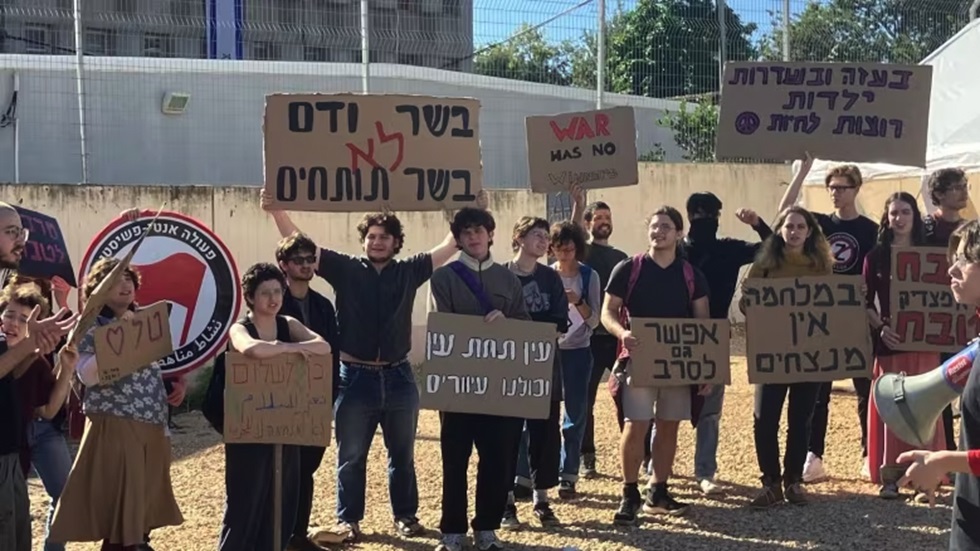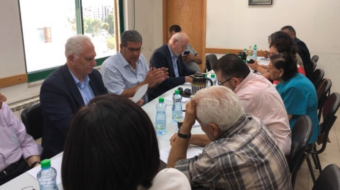
There has been an increase in the number of Israeli youth who are refusing to enlist in the Israeli Defense Forces (IDF). When an Israeli citizen turns 18, they are obligated to enlist, but there are exceptions: Ultra-Orthodox Jews, for example, can avoid service if they are fully committed to studying the Torah. One factor that is not an exception is refusing to enlist based on ideological reasons. And a growing number of youth have refused for precisely these reasons.
Such developments had begun well before the Oct. 7th attack that launched the current phase of open warfare. In widespread demonstrations over the summer and fall, many Israelis expressed pessimism about the current government, which threatens the degree of democracy in Israel. Particularly, about Benjamin Netanyahu’s threat to overhaul the judicial system to give him and his ilk a further entrenchment of power. Critics of the “pro-democracy” movement at the time faulted it for keeping the whole issue of the occupation off the table. The movement largely dissipated, or got postponed, until after the war ends.
Reserve units of the IDF have also resisted being a part of oppressing Palestinians. Among the reasons reservists said they would refuse to serve is the fear that, under orders from the Netanyahu government, they could later be investigated and eventually charged by the International Criminal Court (ICC) for war crimes.
Ariel Bernstein, an activist and former IDF solider, wrote in +972 magazine that at least 10,000 reservists have refused to fight. “[V]arious units signed a letter declaring they would stop volunteering for service ahead of the Knesset passing a law eliminating the High Court’s ability to strike down ‘unreasonable’ government decisions.” Bernstein added that a protest group with thousands of reservists called Brothers and Sisters in Arms have figured prominently in street protests.
“This unprecedented level of refusal, driven by political-moral convictions, has left many astonished,” wrote Bernstein. “The people known in Israel as ‘the best of our sons’—pilots, intelligence officers, and special forces,” who stayed away from politics and were in denial about the IDF’s misdeeds, “are now standing united in the streets and in public petitions encouraging refusal to serve the military machine.”
In that pre-Oct. 7th commentary, Bernstein wrote that “the current movement is not actually anti-militarist in character. Those participating in it are insisting on calling their action ‘non-attendance,’” perhaps implying that they would return to duty if the judicial overhaul fails. Or if war broke out—which it has, suggesting, to some critics, that Israel under attack would quiet the reservists’ reservations in the name of national unity.
Prison for non-compliance
Some resistance was based more on deeper moral principle. When Fred Hidvegi was 17, he had already planned not to enlist when he turned 18. And instead of going along with the obligation to serve, he became a “refusenik.” At that time, Hidvegi knew he risked going to prison if he didn’t serve. That in turn made him anxious.
Hidvegi heard the consistent speeches about how important it is to serve, “a meaningful service for the country.”
“I got a message from the IDF telling me that I’m ‘invited’ to a sorting intended for future paratroopers,” he said. “I don’t want anything to do with the IDF, for obvious reasons. I don’t want to take any part in enforcing apartheid, colonialism, and violent oppression.”
Hidvegi grew “more and more anxious by the day because a professional organization of trained terrorists that calls itself an army wants me to be one of them. And I cannot say no. But, in the eyes of the government, especially the purely fascist one we have now, I should be proud to serve.”
A major part of the IDF’s mission is to kill. “Fighters in the army have a literal license to kill. And to top all that, the propaganda we are fed in school is infuriating.” Hidvegi said that most people know of the professed morality of the IDF. Those among his classmates have been conditioned to believe this and embrace it. And for Israelis who support the Palestinians’ quest for self-determination, they are labeled a “dirty leftist” or a “Nazi.”
It’s ironic that the word “Nazi” has been used as an epithet by ultranationalist Israelis considering those same people support getting rid of the Palestinians, through killing or expulsion, in what could be called a “Final Solution.”
“To destroy and take lives is the main reason for an IDF soldier. Everything else is secondary,” said Hidvegi. “That’s why I will be a paratrooper if I don’t resist. If I don’t defy them. If we all don’t defy them.” Hidvegi chose to resist because the IDF is not, as the state often likes to claim, “the most moral army in the world.” He decided to say no, even at the risk of going to prison.
The transformation to outright resistance has left the Israeli public questioning the “sacredness” of the military. Bernstein notes that this “suggests the possibility that societal attitudes toward the army are indeed evolving.” Bernstein calls this a “new phenomenon altogether,” as reservists have been at the least questioning the Israeli government’s motives, and at the most refusing to participate in any military activity.
Wondering if the movement can persist, Bernstein commented that those refusing could go back into the IDF “perhaps unwillingly,” and his prediction came true: Netanyahu has gained popularity in past times of crisis, and the Oct. 7th Hamas attack, killing over a thousand Israelis and kidnapping over two hundred, shocked most reservists back into service. As Bernstein put it, “as usual, the Palestinians are the ones who pay the price.”
For the time being, the Supreme Court has ruled against Netanyahu’s judicial “reform” which would get him personally off the hook for his crimes, and the reservists have less cause for concern. There now seem to be enough reservists and former military personnel for conducting military operations in Gaza.
Still, when, eventually, the hostilities in Gaza have concluded, either in a mass grave or by some ceasefire or settlement regarding the future of the territory and its habitants, Bernstein writes that the wave of refusal still offered “a rare opening that paves the way for Israelis to question the legitimacy of military actions and perhaps later to reassess their stance on the army’s primary function: maintaining the occupation.”
Other Israeli youth who have come out and refuse going into the IDF include:
- Tal Mitnick, who thought it was inevitable that he would have to join the IDF. He didn’t, however, have a gung-ho attitude about serving as other youth have, the latter being conditioned by militaristic propaganda.
Since military service is mandatory for most Israeli Jews, Mitnick had discussions with his friends about whether they would be willing to serve; that caused a lot of anxiety. There has been an increase in conversations among Israeli youth, especially since the Oct. 7 attack. And there are many within the Israeli population who in the name of “duty” have put aside their hesitations and doubts to wreak revenge for the Hamas attacks.
Mitnick saw footage of the Israeli ground invasion and bombing of Gaza. That convinced him of his decision to resist mandatory service, despite the risk of going to prison.
If he were to go into the military, Mitnick was hoping for a noncombat position so he wouldn’t have the “obligation” to kill Palestinians. But he feared the odds were against that. The possibility of serving time hung over him.
- Yuval Dag is familiar with the Israeli prison system since he was detained for 64 days for resisting. (One can imagine what Palestinians go through.)
Dag turned to social media and didn’t regret it. He says that Instagram is his news source, which posts sources from the left-wing worldwide. Once getting politically conscious from those sources, Dag became aware of what Israeli propaganda is with its bizarre arguments and lies. He sees social media and alternative sources as important entities that could possibly change the minds of Israeli youth, helping them to understand what’s really going on in places like Gaza and the West Bank.
- Sofia Orr, due to social media, found the courage to go public with her stance of resistance. Orr says going online may inspire other Israeli youth to change their minds about going into the IDF. Orr comes from a left-leaning family, so she has solid roots to expand her thinking about Israel.
The risk of Orr to come out as a resister is obvious. Other youth will probably view her as a traitor. She already feels like an outsider for taking a stand. Nevertheless, she is doing her country, and the world, a huge favor by resisting.
If Israel’s right-wing continues to perpetrate its unrestrained violence against Palestinians, Israeli youth may finally wake up and find they have been essentially lied to. That could create an opportunity for real change, starting with getting rid of the cynical Netanyahu regime.
We hope you appreciated this article. At People’s World, we believe news and information should be free and accessible to all, but we need your help. Our journalism is free of corporate influence and paywalls because we are totally reader-supported. Only you, our readers and supporters, make this possible. If you enjoy reading People’s World and the stories we bring you, please support our work by donating or becoming a monthly sustainer today. Thank you!












Comments